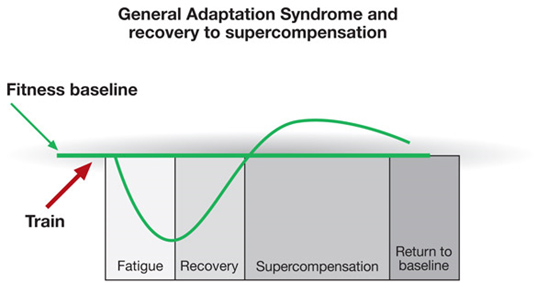This subject is so big it can be confusing so I am going to try to keep it as simple as possible.
Lets start with the Stimulus. There are many stimuli when it comes to exercise, training, hydration (too much or too little), the food we eat or don’t eat, sleep, stress, weather, environment, altitude etc. and all of these different types of stimuli can affect us all differently. As I said it can be so big and so confusing.
Simply put a stimulus is something that brings about a physiological response in our bodies.
Lets look at a simple example of a training stimulus. A runner goes for a 10klm run 3 times per week. He runs the same route and runs it around the same pace each and every time he goes out. He has been doing this for years, his body has adapted and these 10klm runs no longer provides the stimulus they once did. He has a 10k race coming up and wants to run a personal best time. But to improve his 10K run time he must create a different stimulus. He may choose to add in some hill sprints, some interval training or even a tempo run to help him to improve his speed or use all 3 stimuli in the lead up to his race. These different methods of training are a stimulus that cause his body to have to adapt the stimulus.
When we add a new stimulus to our training we must also be careful because adding too much can cause injury or pain that may hinder our training. But to continue to improve we must keep increasing or change the stimulus so our body can adapt to the stimulus and become stronger.
Before I finish remember that there are many stimuli that can impact on our performance, something as simple as improving your diet to getting the right amount and quality of sleep can be a stimulus that helps you to find that improvement you are looking for.
The Super Compensation Theory
The super compensation theory, sometimes referred to as the overcompensation theory, is a theory that explains what happens to our bodies when we train, when we recover and what happens if we don’t train again soon enough.
The image below shows what happens when we train.

After a training session our body goes into fatigue and recovery mode. Train hard and this fatigue and recovery period may be longer, after an easier session and this period will be shorter. After the recovery period your body will over compensate for the session and will get itself ready to for your next session. Ideally this is when you want to train again to take advantage of this overcompensation. If you don’t train in this overcompensation period then your body will return to its previous baseline fitness.
Now here is the tricky part, everyone is different, and in fact you may be different from one week to the next depending on how hard the session is, if you have fully recovered from a previous training session as well as other stimuli (see the Stimulus and Adaptation article for more on this). The fitter you are the quicker your body will recover from a work out. E.g. an experienced marathon runner will recover more quickly from a 30k run than a first time marathon runner will.
So how do you apply this theory to your training? Trial and error really, it takes time to understand your body and how it adapts and recovers from a training session. If you are a beginner I suggest that you keep a training diary to not only record your sessions but to also note down how you feel after each session how you recover how you are feeling before your next session, but most importantly listen to your body and increase or decrease the intensity of your next session based on how your body is feeling. Here’s a hypothetical example, I’m training for my first 10klm run and 2 days ago I completed my first 8klm run as part of my training program, there were some hills in the run and I got a little bit carried away and ran faster than I should have because I ran with a friend who is a better runner than me. Today I am due to do some interval speed training, however my right hamstring is really tight and my legs are generally feeling fatigued. Should I stick to my training program and do the speed work and risk an injury or should I go for an easy run and leave the speed for tomorrow or the next day?
I don’t want to injure myself so I am going to go for an easy run do some extra stretching, maybe get a yoga session or a massage in to help my hamstring recover. My body will also benefit from the easier run as it will encourage blood flow and fresh oxygen to get to the sore muscles and help them to recover.


 No Comments
No Comments No Comments
No Comments